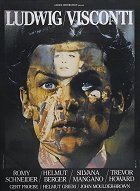Réalisation:
Luchino ViscontiPhotographie:
Armando NannuzziActeurs·trices:
Helmut Berger, Trevor Howard, Silvana Mangano, Gert Fröbe, Helmut Griem, Umberto Orsini, John Moulder-Brown, Sonia Petrovna, Folker Bohnet (plus)VOD (3)
Résumés(1)
En 1864, Louis II de Bavière est couronné roi. Il n'a que 19 ans et ne s'intéresse guère à la politique, préférant la musique et la littérature. La même année, il fait la connaissance de son idole, Richard Wagner, et décide de subvenir à ses besoins ainsi qu'à ceux du chef d'orchestre Hans von Bülow et de sa femme Cosima. Mais quand il apprend que Wagner et cette dernière sont amants, il prie le compositeur de quitter Munich. Bien que son pays soit en guerre contre la Prusse, Louis II se désintéresse totalement du sujet, préférant courtiser sa cousine l'impératrice d'Autriche... (Les Acacias)
(plus)Critiques (2)
The Real Sissi for the Fourth Time, or Helmut Berger and Romy Schneider in an opus that lasts not only four hours, but at least a whole week in subjective perception. I'm convinced that Visconti was only concerned with Ludwigian material for the satisfaction of his love for Berger. And if he already strengthened this strong bond with his continued love for Romy and her complicated relationship with the Empress, I don't ever want to read any deep analysis on the subject... better to die than to relive this polygon of vanity and lust. And that's leaving aside all the subtext regarding Silvana Mangano and the variations with The Damned. However, it is amazing how Ludwig: The Mad King of Bavaria follows Marischka's Sissi trilogy so naturally, neither rubbing it in nor negating it, just picking up where the Empress' heart was broken. It would have been unforgettable if Romy had lived to see her own interpretation of Elizabeth's death, and only then could her own life have begun.
()
I get the feeling that Luchino Visconti would understand Ludwig quite well and if he had the opportunity to live in his time, he would probably belong to the circle of people that let Ludwig sustain them and create things for him. I see the same indifference towards the common viewer that Ludwig probably felt toward the ordinary subjects of his state. Visconti is interested in the formal perfection of camera shots, the lyricism of scenes, and the musical accompaniment. However, the film is oversensitized. A filmmaker who considers his audience and works with the knowledge that he creates for them would not hesitate to cut certain shots. That never occurs to Visconti. At the same time, he is obsessed with his protagonist at the expense of depicting the era in which Ludwig lived. Incidentally, he does the same thing that the elites of the time did, in that they did not pay any attention to ordinary citizens and certainly did not consider them equal human beings with the right to have a say in public affairs. Yet it was precisely the case of Ludwig II that compromised such a style of behavior and thinking. Ludwig was completely incompetent in governing his state and yet he had immense authority, which stemmed solely and only from his family traditions. No one could stand up to him for a very long time because they were paralyzed by respect and fear of his majesty. True, the rule of Ludwig II was more pleasant than, let's say, Caligula's, but it does not change the fact that in a democracy, which is by the way not a guarantee that people will choose the most competent person, he would be absolutely without a chance to gain any public influence. My two stars are for the unquestionable aesthetic qualities of Visconti's film, the rest I have no interest in. Overall impression: 45%.
()


Annonces